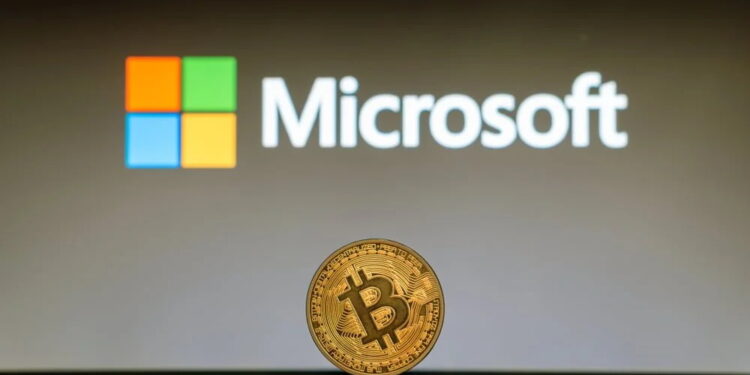Microsoft's plan to invest heavily in Bitcoin was killed instantly, and its support rate fell below
 summary:
shock! Microsoft's plan to invest heavily in Bitcoin was killed instantly, and its sup...
summary:
shock! Microsoft's plan to invest heavily in Bitcoin was killed instantly, and its sup... shock! Microsoft's plan to invest heavily in Bitcoin was killed instantly, and its support rate fell below 1%!
Here’s the translated article with improved grammar and readability:
At Microsoft’s shareholder meeting on December 10, a proposal regarding Bitcoin investment was overwhelmingly rejected. According to Microsoft’s latest filing with the U.S. Securities and Exchange Commission (SEC), only 0.55% of shareholders supported the proposal, effectively ensuring its defeat. This outcome has sparked further discussion in the market about how major tech companies are addressing digital assets like Bitcoin.
The proposal, put forward by the National Public Policy Research Center, suggested that Microsoft allocate 1% of its total assets to Bitcoin as a potential hedge against inflation. However, Microsoft’s board explicitly opposed this, citing Bitcoin’s high volatility as inconsistent with the company’s prudent investment principles. The board emphasized that Microsoft has already returned over $2 trillion to shareholders through dividends and share buybacks, demonstrating a cautious approach to capital management, without the need to adopt high-risk cryptocurrencies as a hedge.
The Challenges of Bitcoin’s Enterprise Adoption
Although Bitcoin has gained attention in recent years for its potential role in corporate asset allocation, its volatility and uncertainty remain major challenges. Microsoft’s board stance reflects the consensus among many traditional large enterprises that cryptocurrencies have yet to establish themselves as reliable asset classes. For instance, Bitcoin prices soared to nearly $69,000 in 2021, only to plummet below $20,000, highlighting its unpredictable nature, which deters many companies.
Michael Saylor, the founder of MicroStrategy—a prominent Bitcoin advocate—has actively pushed for companies to invest in Bitcoin, citing his company’s substantial returns from Bitcoin holdings as a persuasive example. However, MicroStrategy’s experience illustrates the high-risk nature of Bitcoin, where fluctuations in its price have a significant impact on the company’s market value, making it unsuitable for enterprises like Microsoft that prioritize stable growth.
Moreover, accounting and tax-related challenges have led companies to exercise caution regarding Bitcoin. The Financial Accounting Standards Board (FASB) has yet to establish clear accounting standards for cryptocurrency, creating uncertain financial reporting implications for companies holding Bitcoin.
Low Market Expectations
Prior to the vote, market sentiment was largely pessimistic regarding Microsoft’s potential acceptance of Bitcoin as an asset class. Decentralized prediction platforms like Polymarket indicated that the proposal had only a 12% to 16% likelihood of passing. This reflects a lack of confidence among investors regarding Microsoft’s willingness to adopt digital assets as part of its core strategy.
This market response aligns with Microsoft’s established position. As one of the world’s largest tech companies, Microsoft is known for its emphasis on stability and sustainable growth, basing investment decisions on long-term interests rather than short-term gains. In contrast, companies like MicroStrategy tend to be more adventurous in exploring cryptocurrencies, reflecting differences in business models and corporate cultures.
Other Proposals and Corporate Responsibility
In addition to the Bitcoin proposal, the shareholder meeting addressed several other proposals related to corporate responsibility. These included requests for Microsoft to release reports on the risks associated with artificial intelligence (AI) and misinformation, as well as an examination of the potential ethical implications of the company’s involvement in military technology development. However, these proposals also failed to gain sufficient shareholder support.
Regarding AI, the focus was on how companies manage potential misuse of AI technologies, such as generating deepfake content or spreading misinformation, which could pose risks to societal stability and corporate reputation. As a leader in the AI field, Microsoft is increasingly under scrutiny regarding its responsibility in these areas.
The military technology proposal, concerning Microsoft’s involvement in U.S. defense projects, has sparked ethical debates. Since winning the $10 billion JEDI contract from the U.S. Department of Defense in 2019, Microsoft has been a focal point of public discussion. Some shareholders believe the company should conduct more transparent evaluations of the risks involved in its military technology initiatives and weigh their potential impacts on global stability.
Future Direction of Microsoft
Although none of the proposals gaining widespread attention were approved at this shareholder meeting, it revealed the strategic choices facing tech giants in a rapidly evolving economic and technological environment. Microsoft’s cautious approach indicates its prioritization of long-term sustainable growth rather than chasing short-term trends.
That said, as cryptocurrencies like Bitcoin continue to mature, corporate investment behavior may gradually shift. In the future, factors such as improved regulation and the growing applicability of cryptocurrency technology could play a significant role in shaping corporate decision-making.
Tags: Bitcoin, Microsoft, Shareholder Meeting, Cryptocurrency, Corporate Investment


